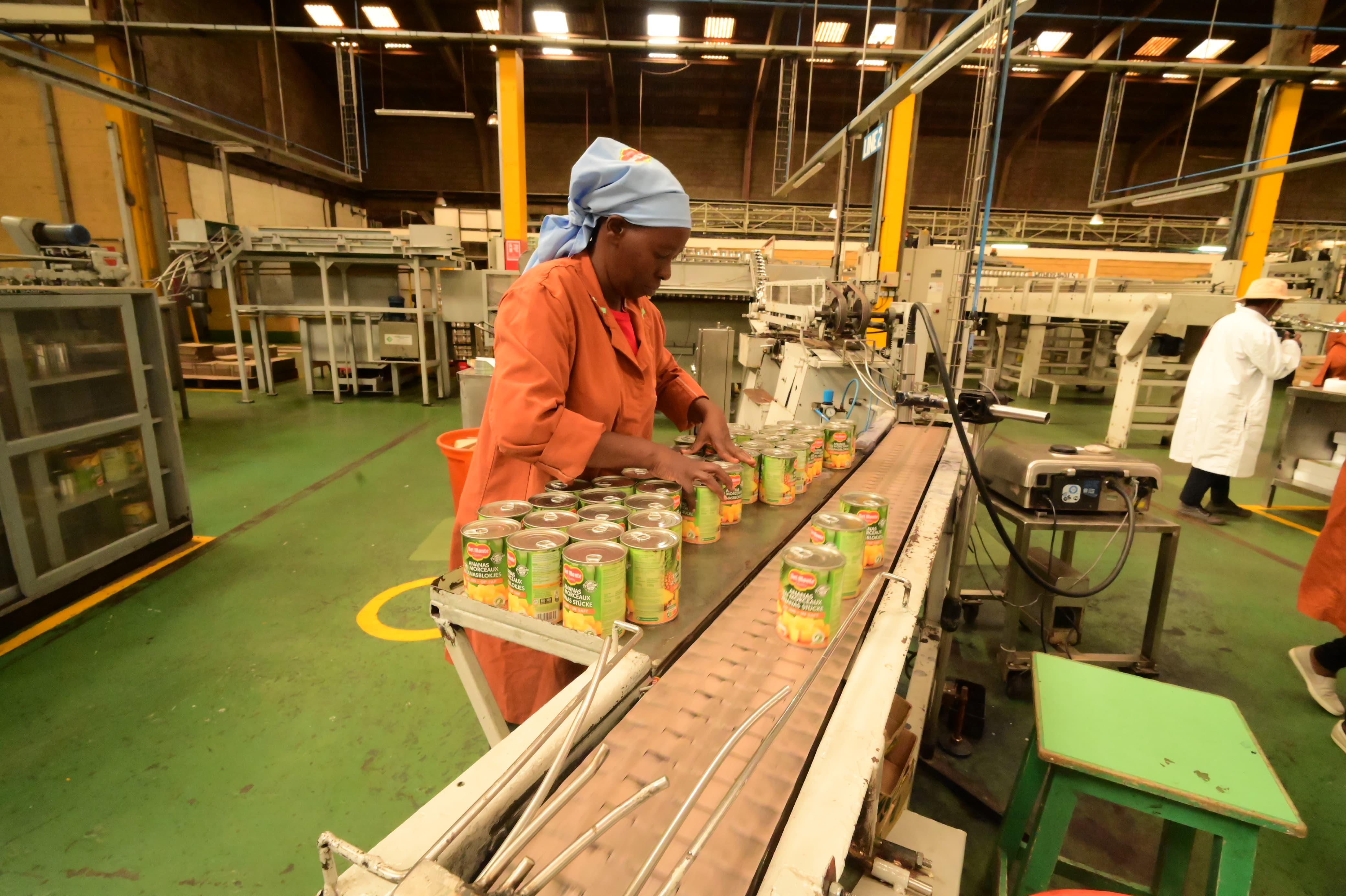
As the morning sun breaks over the expansive fields of Del Monte Kenya Ltd, Teresia Makau is already up and dressed in her full protective gear, including a head wrap, gloves a dustcoat and boots.
Her steps are of quiet determination as she enters the factory, heading towards the labelling section, where she reports to her supervisor, ready to take on whatever the day’s orders demand.
By 6am sharp, the machines are humming and stacks of canned pineapples are rolling in.
Teresia is part of a well-oiled system that keeps the legacy of Del Monte alive.
Across three shifts from dawn to dusk and deep into the night, workers keep the production line going to keep up with the global demand for Del Monte’s iconic fruit products.
“Our shifts run from 6 am to 2 pm, then 2 pm to 10 pm, and 10 pm to 6 am,” Teresia says.
“We follow customer-specific orders each day. We get a 30-minute tea break, then return to work until our shift ends and we get lunch.”
Teresia has worked at Del Monte for 12 years, and her pride in the company is unmistakable.
“We are all given personal protective equipment (PPE), which is replaced annually or earlier if it gets worn out,” she says.
Del Monte’s benefits go beyond the basics. For working mothers, the support is especially meaningful.
“We get three months of fully paid maternity leave. After that, there is a one-year lactation period,” she says.
“We have lactation stations around, and during each shift, we are allowed two breaks to breastfeed or express milk — one right after the tea break, and another if needed.”
She continues, “Our salaries are fair, and everything operates under Collective Bargaining Agreements that are reviewed every two years.”
Teresia says their safety is a priority for the company. “There is a safety committee and a welfare committee to make sure our voices are heard.”
For workers and the community around the massive pineapple farm — Kiambu, Murang’a and Machakos — the perks go beyond employment opportunities.
“The company also sponsors our children’s education and organises frequent medical camps, not just for us, but for the wider community, too,” Teresia says.
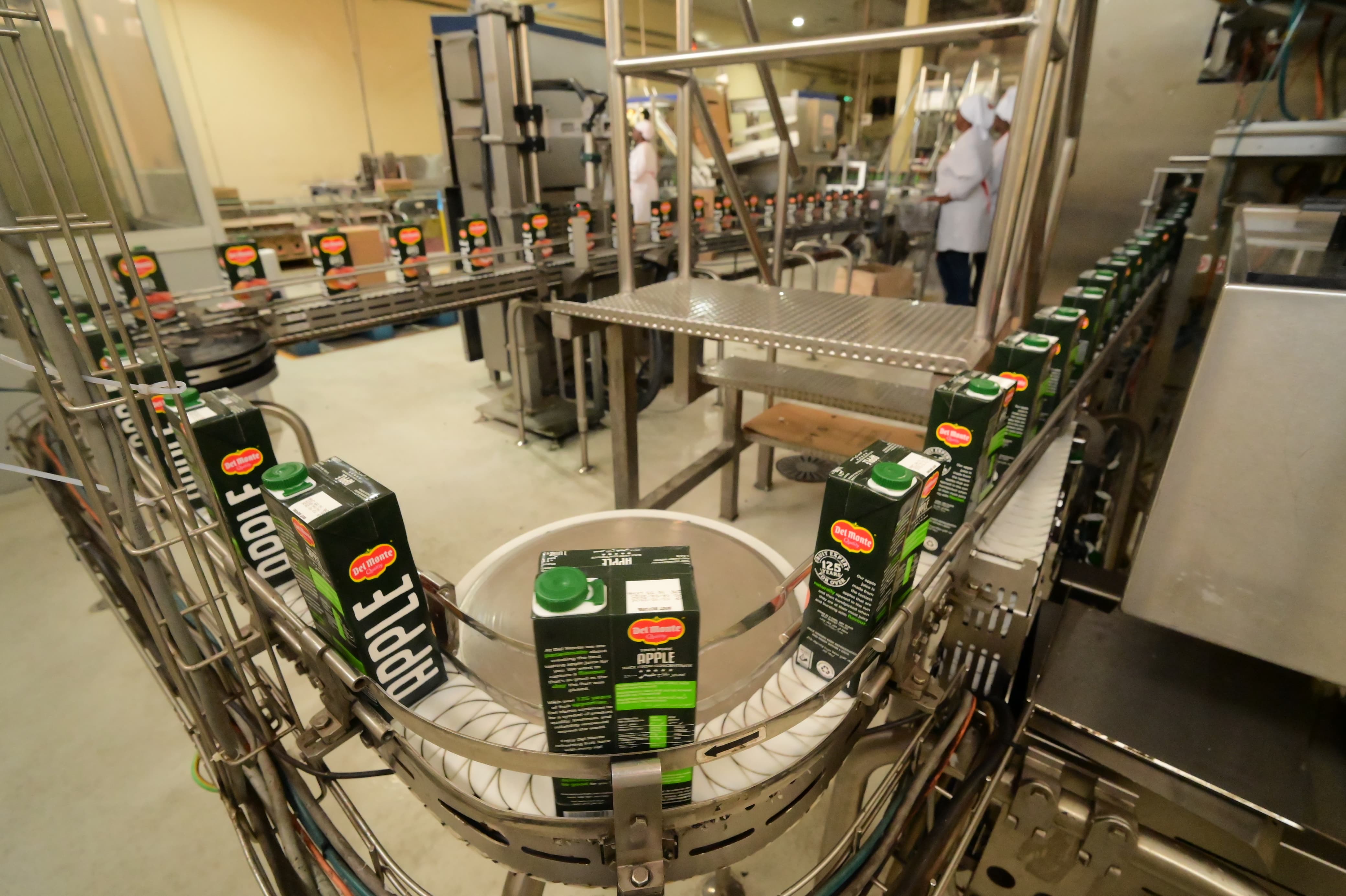
WELFARE AGREEMENTS
Teresia’s story is echoed across Del Monte’s massive workforce, where thousands like her thrive under structured support systems.
As Labour Day approaches, voices of leadership, representation and solidarity speak to the rights upheld and the hope sustained.
Francis Mwangangi, the chief shop steward of the Kenya Plantation and Agricultural Workers’ Union at Del Monte, is a voice representing the farm workers.
“I also work in the irrigation department,” he shares with quiet pride, underscoring a grounded connection not just to leadership but also to the very soil that feeds the nation.
For Mwangangi, the cornerstone of worker welfare at Del Monte is the Collective Bargaining Agreement, a binding document forged between the union and company management.
“We trust it is the best among the CBAs in this country. It handles everything, from working conditions and protective gear to welfare policies and disciplinary procedures,” he says.
Negotiated after two years, the current CBA runs from 2023 to 2025, with proposals for the 2025-27 agreement already submitted.
“Our first CBA with the company was negotiated in 1981,” he says, marking more than four decades of structured dialogue.
When asked about the steps the union takes to ensure better working conditions, Mwangangi is clear: “The CBA plays a big role. It outlines the responsibilities of management and places boundaries around how our workers should be treated.”
Behind his words is a deep sense of solidarity, not just with the union but also with the workers themselves.
“At times, we may have ups and downs because nothing is straight. But when we have a strong relationship, we can hear each other out. Even if there are grievances, we sort it out in a manner that is amicable,” Mwangangi says.
It is this culture of negotiation, understanding and mutual respect that Mwangangi believes sets Del Monte apart.
“We are on the same page,” he says.
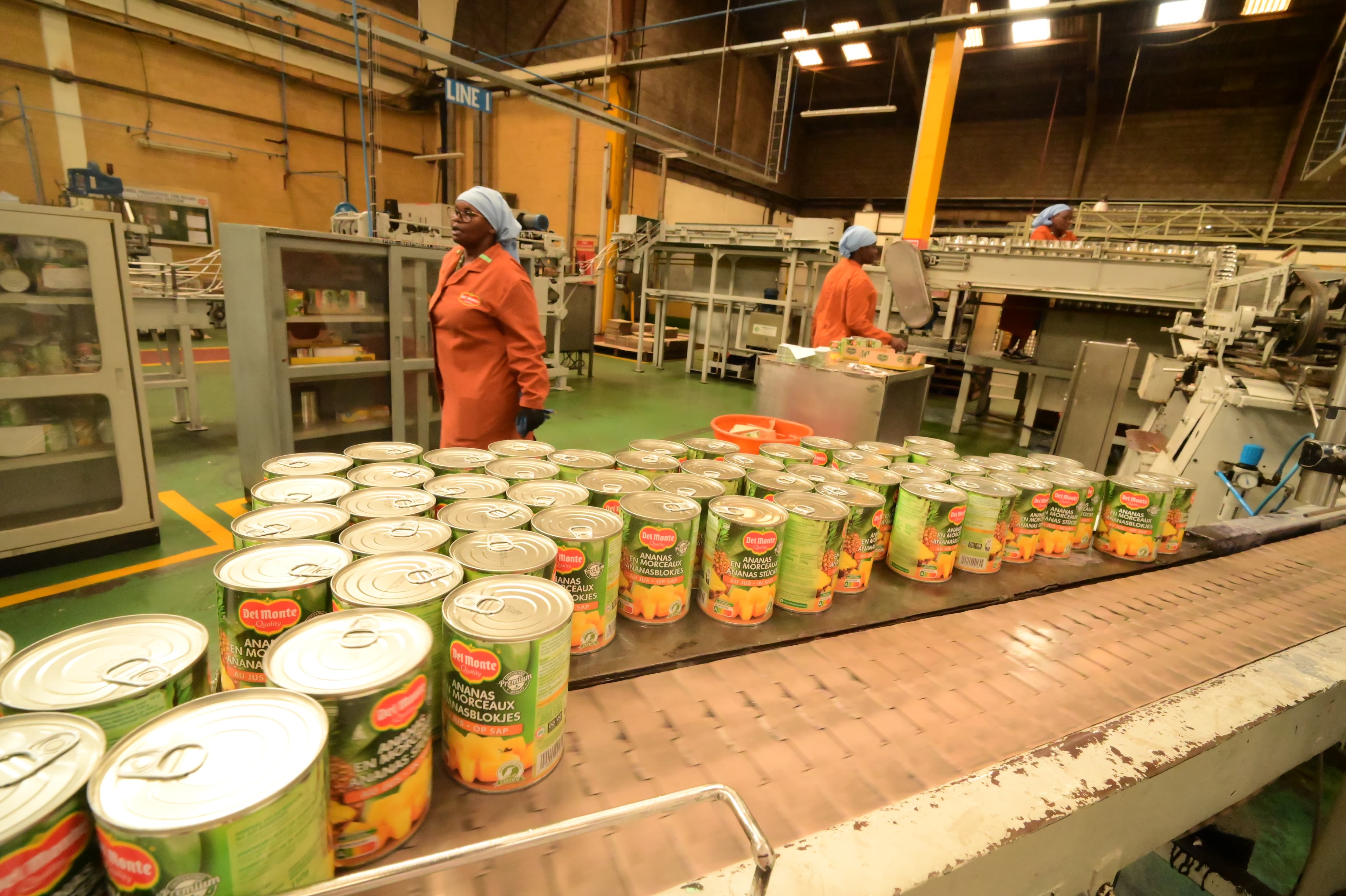
As International Labour Day is observed, Mwangangi’s message is one of hope and continuity
“To my fellow employees, the company we work for is a friendly one. We will go into another CBA knowing that even when issues arise, we will still stand with our partners and live by a CBA that respects their lives,” he says.
At the Cannery, which is outrightly a high-demand production unit, another voice represents the thousands of workers.
Meshack Owino, the newly elected chief shop steward, representing the workers under the Kenya Union of Commercial Food and Allied Workers, ensures their rights are fully observed.
With rising demands on productivity, ensuring workers’ welfare is no small feat. But Owino is clear.
“We have an agreement within the CBA, and both management and worker representatives are bound to operate within that structure,” he says.
The CBA is not just a document; it is the framework of fairness. It governs working hours, wages, recognition and dispute resolution, all renegotiated every two years.
“We hold elections every two years, and now we’re in the process of renegotiating. The previous CBA from 2023-25 has just expired,” Owino says.
The new negotiations include a wide scope, from salary increments and revised terms of service to redefining entry points for new hires.
“We’re working to reduce the number of years it takes to reach certain wage levels,” he adds. But it’s not just about numbers.
“We also focus on ensuring each employee understands why they are part of Del Monte. There is a business aspect to it, a level of marketing and training that helps workers know their value,” Owino says.
Once ratified, the CBA becomes policy that subsequently becomes law, and then enforcement becomes the union’s role.
“When management fails to meet any agreed condition, we step in to ensure compliance,” he says.
“The good thing is that the company respects the CBAs, we have never experienced salary delays within our factory. Everything runs smoothly because of that teamwork.”
Del Monte Kenya values the dedication of its employees. The company has continuously honoured employees for their service as well as celebrating those retiring.
In 2024, 75 employees retired and were celebrated, while 40 others were awarded for long service.
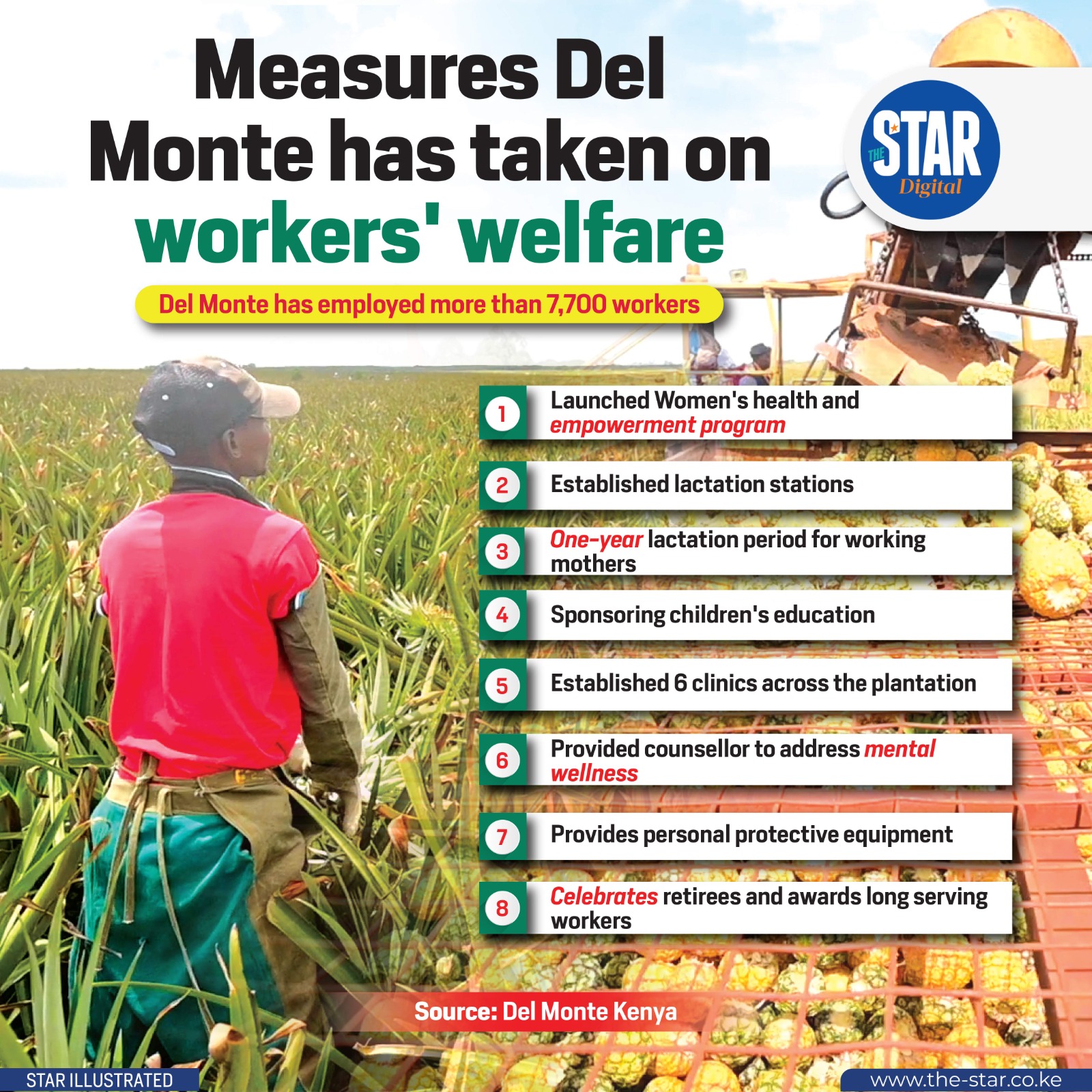
WORKERS FIRST
In a company as vast and complex as Del Monte Kenya, people are the driving force. Behind those people stands a strategic and evolving human resources department, led by Gedion Kimutai.
Managing a workforce of more than 7,700 employees across three counties, Kimutai gives insight into how the company weaves diversity, welfare and professional development into its operations.
“We are a company that embraces diversity and inclusion. While certain roles may lean towards specific genders due to their nature, we strive to balance the scale,” he says.
“Currently, women make up 36 per cent of the workforce (2,840), while men account for 64 per cent (4,958). Almost the entire workforce, 99.9 per cent, is Kenyan, with only a small fraction being expatriates.”
Del Monte’s operations span land preparation, crop protection, canning, juice processing, exports and more, each requiring specialised skill sets.
"From general workers to engineers and directors, the skill range is vast, and we prioritise hiring from the local community,” Kimutai says.
To bridge skills gaps, Del Monte has invested heavily in training. From basic health and safety awareness to advanced plant maintenance and research, the company provides structured learning opportunities.
“We always aim to promote from within,” Kimutai says, citing a strong technical development system to upskill employees. But technical skills are only part of the equation.
Employee welfare is equally prioritised.
“We have a dedicated welfare department that looks after our staff’s well-being,” Kimutai says.
Recognising the pivotal role of women in its operations, Del Monte Kenya launched a comprehensive Women’s Health and Empowerment programme in 2020 in partnership with the United Nations Foundation.
The programme had reached more than 11,860 women by 2024.
“While technical skills are crucial, employee welfare is just as important. Del Monte Kenya recognises that when women are supported in both their professional and persona lwell-being, it creates a foundation for growth and success within the company,” Kimutai said.
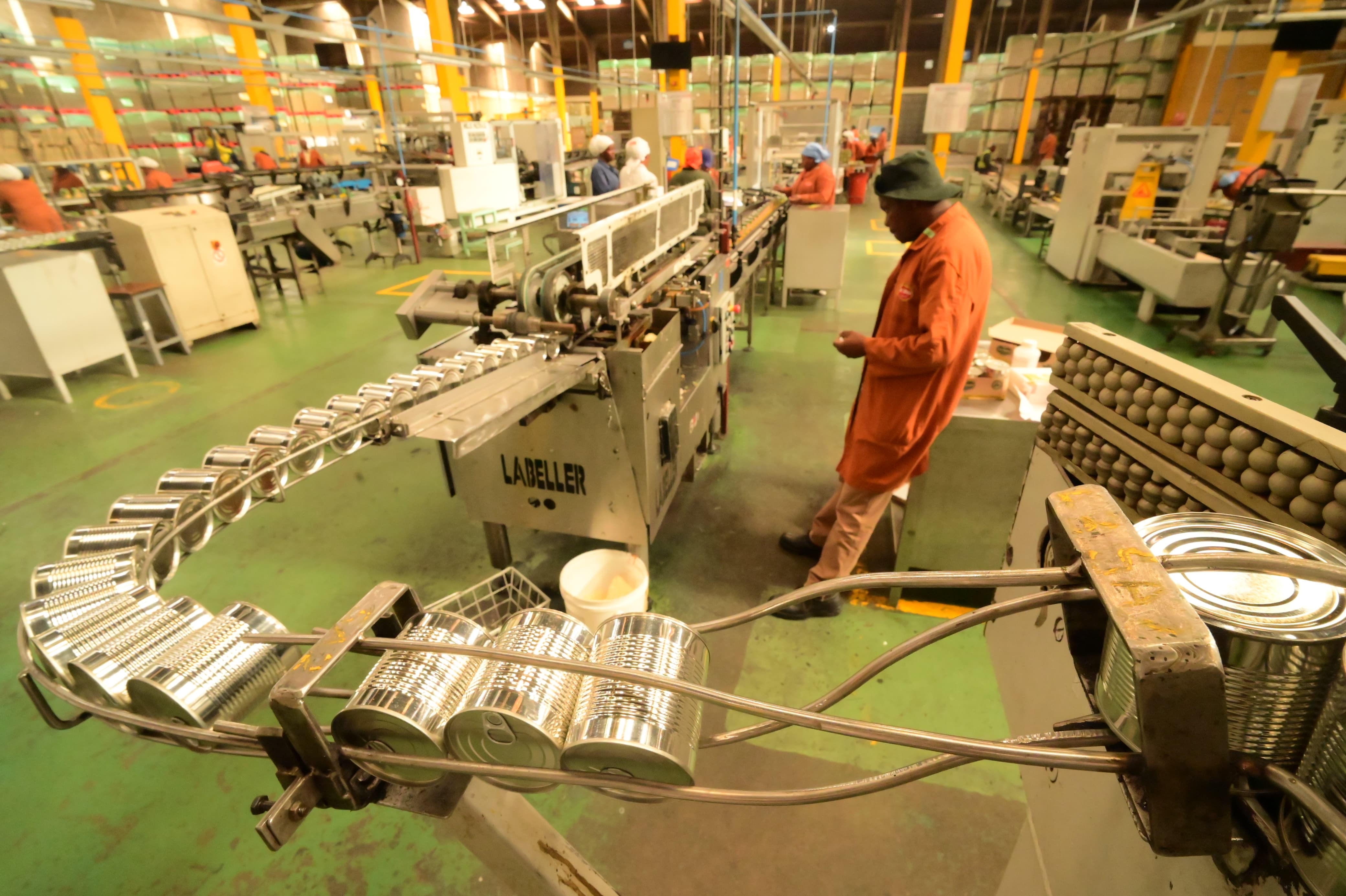 Del Monte Factory (Photo: VICTOR IMBOTO)
Del Monte Factory (Photo: VICTOR IMBOTO)“Empowering women strengthens the entire workforce and community.”
The programme offers reproductive health services, cancer screenings, contraceptive access and education on menstrual health and sexually transmitted infections.
Additionally, it includes training to prevent gender-based violence and sexual harassment, fostering a culture of respect and equality within the workplace. The establishment of lactation stations promotes women’s welfare, Kimutai said.
This is in line with the Kenya Health Act of 2017, to support nursing mothers.
The facility provides a conducive environment for breastfeeding, along with educational classes on proper breastfeeding practices. This initiative underscores the company’s commitment to supporting female employees in balancing work and family responsibilities.
“Recently, we have conducted research to establish breastfeeding stations across our farms, ensuring that new mothers have supportive environments,” he said.
In addition to six clinics spread across the plantation, the company organises community medical camps and runs schools for employees’ children and surrounding communities, from early childhood education to high school. Mental health is also a growing focus.
“We’re looking to hire a full-time counselor to address mental wellness,” Kimutai says.
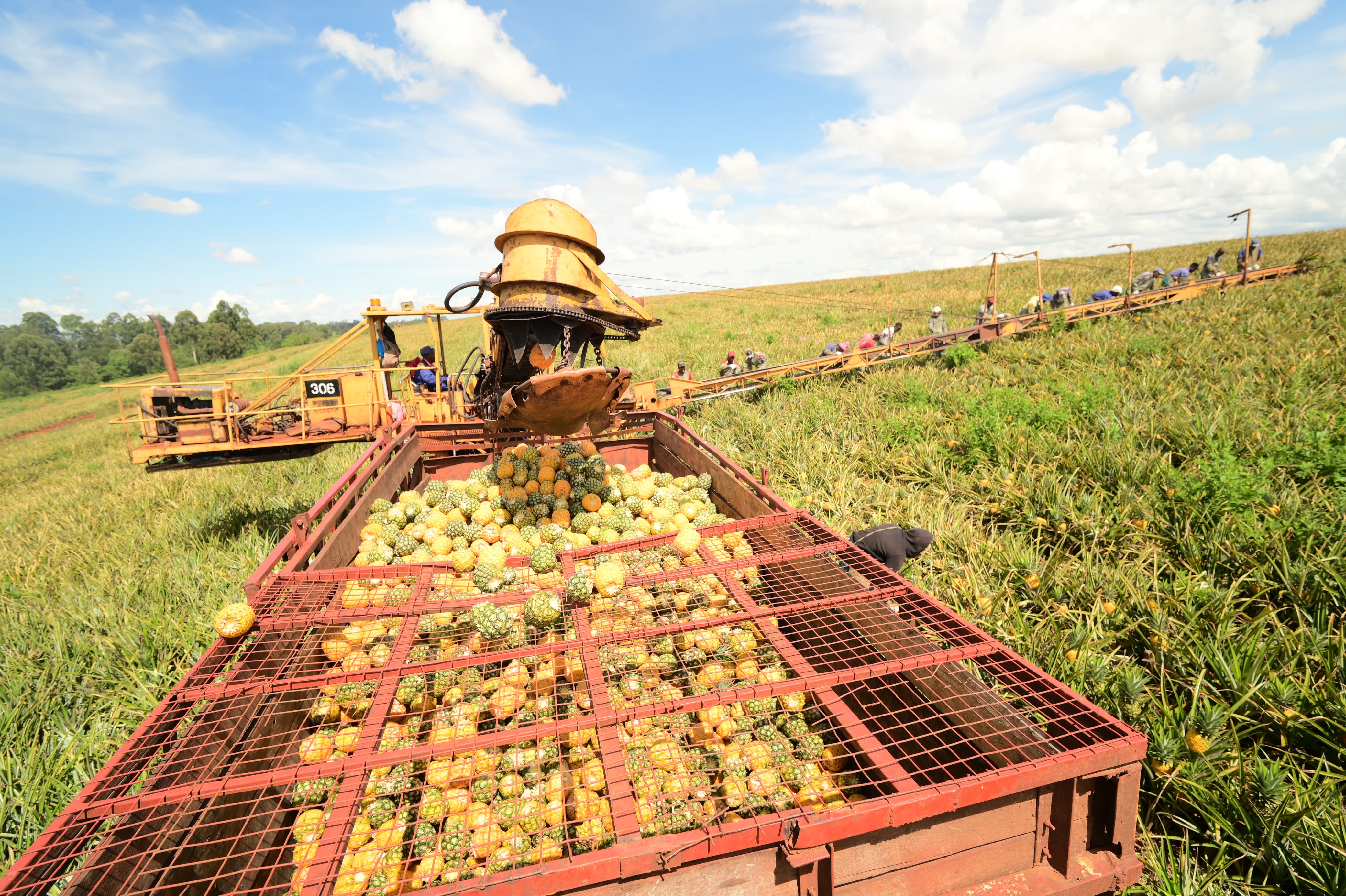
Still on prioritising worker’s health, Del Monte Kenya implemented stringent health and safety measures during the Covid-19 pandemic.
The company established a six-bed holding room for employees exhibiting symptoms, increased sanitation protocols and enforced social distancing within its facilities.
These proactive steps were recognised by the United Nations Women Foundation, highlighting Del Monte Kenya’s dedication to employee well-being during challenging times.
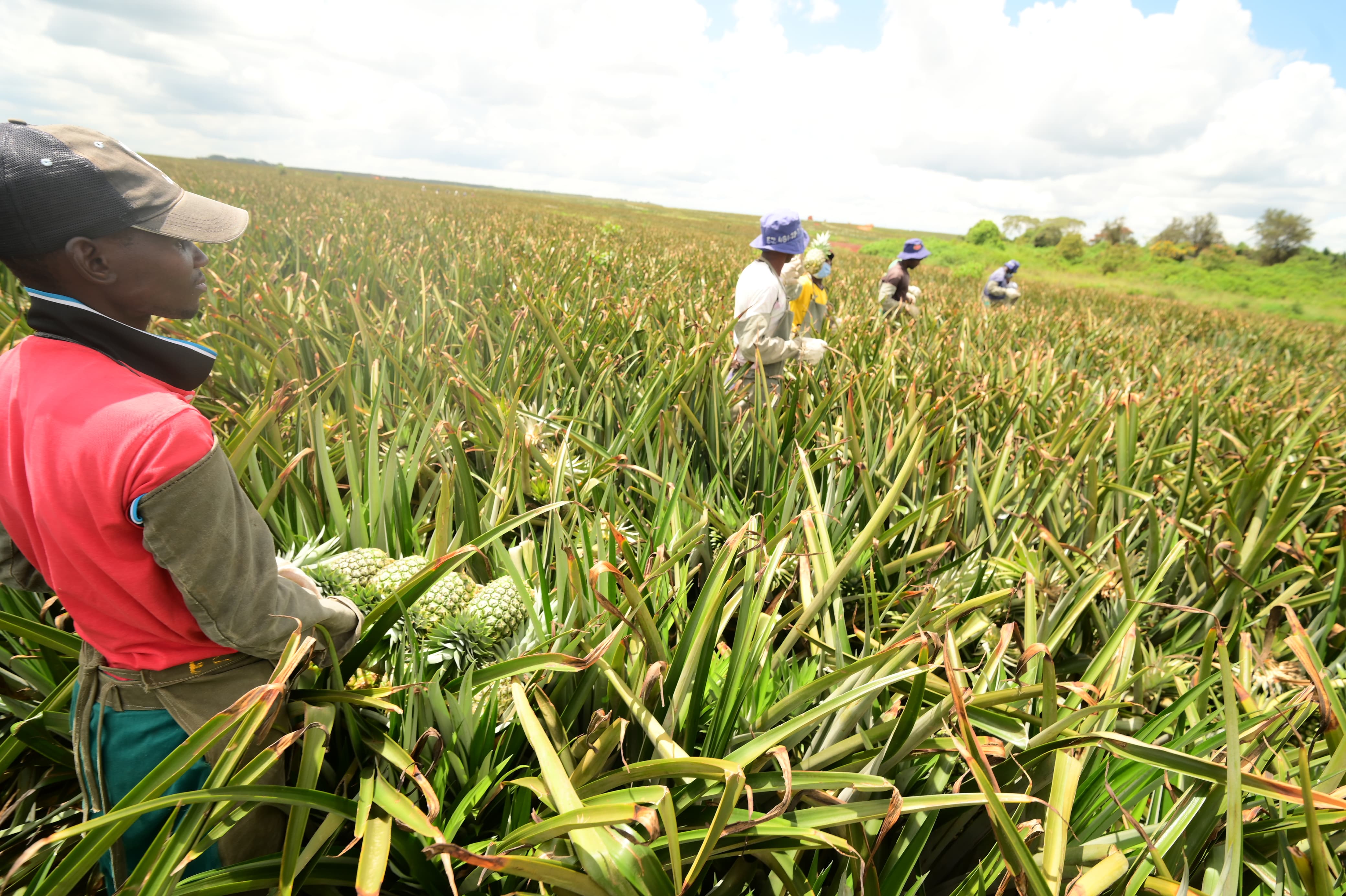
HEALTH, WELL-BEING
The company’s then managing director Stergios Gkaliamoutsas said the facility was set up following a recommendation from the National Covid-19 Emergency Response Committee and the Ministry of Health.
“The health and well-being of our employees and their families remain paramount, and we’ll do whatever we can to protect them,” Gkaliamoutsas saus.
“We keep abreast of the latest advice from national health bodies so we can respond appropriately to new developments.”
Another project, ‘kitchen gardens’, encourages employees living in staff quarters to grow vegetables and keep poultry. Kimutai says it’s about food security and self-sufficiency.
On safety, Del Monte takes a job-specific approach to PPEs. “We conduct PPE analysis for each role,” the HR manager says.
“From basic gear like gloves and gumboots to more advanced equipment like face masks with cartridges for those handling sprays.”
Additionally, in response to recommendations from a Human Rights Impact Assessment, Del Monte Kenya partnered with G4S Kenya to oversee its security operations.
This collaboration ensures that about 270 security professionals, trained in de-escalation techniques and minimal use of force, maintain a safe environment for employees and the surrounding community.
Kimutai says they hold regular consultative meetings with union representatives and senior management to find solutions for any arising issues.
To streamline HR functions, the company is divided into two operational zones, each with HR officers on the ground. A full-scale department at the head office handles everything from compliance to training.
“Our HR system is designed to be inclusive, responsive and rooted in community, because when we care for our people, everything else follows,” Kimutai says.

















